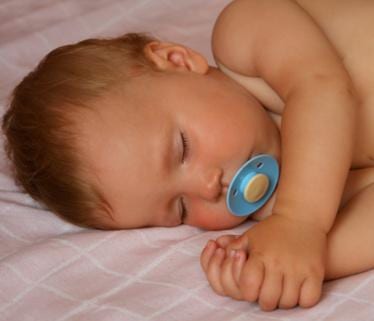The debate over co-sleeping and sleeping alone is longstanding. Whether a child should sleep alone or with his parents has been the subject of much discussion and controversy. Although many parents enjoy co-sleeping, the American Academy of Pediatrics cautions against routine infant-parent bed sharing because of the risks associated with it.
Safest Sleep Space
The American Academy of Pediatrics recommends that babies be placed in a bassinet or crib in the same room as their parents, within an arm’s reach. In addition to providing for easy nighttime feedings, having your baby close allows you to closely monitor him and respond to his needs. For parents who want the best of both worlds, a co-sleeper is an option. A co-sleeper attaches to the side of an adult bed. Once attached, the bassinet mattress and adult mattress are at the same height. Since a co-sleeper has an open side facing the adult bed, it allows for easy access to the baby.
Dangers of Bed Sharing
For parents who sleep with their babies on couches, this can be a dangerous move. While you’re both sleeping, your baby could become trapped between the cushions or between you and the back side of the couch. This could cause suffocation, injury or death. When sharing a bed, the baby is also at risk for these things. Both adults and babies move around in their sleep. A parent could potentially roll onto the baby, the baby could roll off of the bed or the baby could be smothered by the bedding.
Benefits of Sleeping Alone
In addition to reducing the risk or suffocation, injury or even death, having your baby sleep alone has other benefits. Since there is no one in the bed with your baby, he won’t be awakened by your movements, breathing or snoring or the creaks and movements of the bed. Uninterrupted sleep is better sleep for you and your baby. In addition to not worrying about rolling onto your baby, when your baby sleeps alone you won’t be awakened by his movements. For couples, having your baby sleep alone promotes sexual relations since no one else is sharing your bed.
Safe Sleep Environment
When your baby is sleeping alone, it’s important to secure a safe sleep space since she won’t have constant supervision. Your baby should be in a crib or bassinet with a firm mattress. Because loose bedding can pose a suffocation risk, instead of using blankets, opt for a sleep sack. Although you may be tempted to keep the room your baby sleeps in warm, to prevent overheating, keep the thermostat set at a temperature that is comfortable to a lightly clothed adult and dress your baby lightly for sleeping. If your baby is in a separate room, use a baby monitor so that you’re able to hear her.
Age for Solo Sleeping
Given the risks associated with co-sleeping, babies should always sleep in their own sleep space. Although holding your baby while he sleeps and while you’re awake is acceptable, anytime you sleep with your baby, you place your baby at risk. Having your baby sleep alone in his own safe sleep spaces significantly eliminates the risk of suffocation, strangulation and other injuries.





